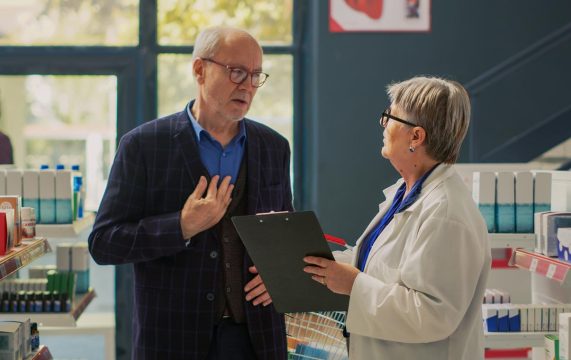Advertisment
EAHP 2012 Report – Compassionate use and off-label medicines

by Zara Qadir reporting on the presentation by Yechiel Hekster (pictured), Professor of Clinical Pharmacy, and a member of The Netherlands Medicines Evaluation Board.
Off-label prescribing and compassionate use programs are in place in each European country, under the umbrella of the EU directives. However, applications differ from setting to setting, based on local rules and procedures. Yechiel Hekster, a Professor of Clinical Pharmacy, and a member of The Netherlands Medicines Evaluation Board offered practical advice to hospital pharmacists on appropriate use of drugs beyond the label. Dr Bélorgey, Head of Department of Clinical Trials at the French national competent authority (Afssaps, Agence nationale de sécurité sanitaire des produits de santé), spoke of her experience of compassionate use and the ATU (authorisation temporaire d’utilisation) system in France.
The challenge of optimising appropriate off-label use in Europe
“Off-label use is defined as the practice of prescribing drugs outside the scope of the drug’s approved label, most often concerning the drug’s indication and dosing, and especially for other patient groups such as children,” explained Professor Heckster, who offered a balanced perspective as both a pharmacist and regulator.
Health regulatory authorities are increasingly faced with a dilemma. While off-label prescribing can address unmet needs (e.g. Methotrexate use in children under 3 years) with no formal safety assessment its use carries unknown risks and uncertainties. Often, there is insufficient data available for a formal benefits/risk (B/R) ratio to be assessed by regulators for off-label use. Consequently, decision-making for prescribing Off-label use is more often reliant on opinions rather being evidence-based.
Professor Heckster emphasised the need for revitalising the drug registration process. “Unfortunately, where there is no off-label use policy, there is no effective therapy in many important medical needs situations, and often with no policy, there are too many restrictions,” explained Heckster.
Health authorities are only able to assess data that is submitted from research findings through randomised-controlled trials, initiated by the pharmaceutical industry. Unfortunately, not all indications are covered in marketing authorisation applications. There is often little attention for specific patient groups such as children, the elderly, and rare diseases. The consequences of lack of licensing mean there is a shortage of research data available, and no balanced opinion on indication/safety/efficacy. Other issues arising from lack of information supply include trial error dosing and adverse reactions.
Drug registration for regulators relies on a positive B/R assessment and balancing information on severity of disease, treatment alternatives, efficacy data and side effects. However, opinions on minimal acceptable harm and efficacy can vary, with patients often accepting a higher risk/lower efficacy ratio than regulators1. A German study2 has also shown that an efficacy-effectiveness gap exists between a trial population and patients seen in clinical practice. Medications may be less effective, and if inappropriately prescribed can result in a negative B/R ratio.
“Off-label discussion is an important issue, not only for clinicians, but for health authorities, considering the impact on patient care and promotion of safe and appropriate use of drugs,” emphasised Professor Heckster. “The label and the SmPC are key issues in the chain from Medicines Evaluation Board to patients,” explained Heckster.
‘Bad’ or inappropriate off-label use of new drugs is risky for both patient safety and also for the drug’s standing (in its authorised indications). However, it is generally recognised that ‘appropriate’ or ‘good’ off-label use of drugs can represent the standard of practice to support the medical needs of patients for which no other (or limited) therapies are available. Professor Heckster proposed criteria for ‘good’ off-label use. “If there is no (authorised) alternative available, or when an authorised alternative is available, only if the clinical benefit is substantial.” Heckster also stipulated that there must be informed consent and a solid scientific basis (in a guideline or standard) for use.
Pharmacists play a supporting role for clinicians in evaluating the rationale of off-label use. In The Netherlands (July 2007), a new law on drugs in health care specifies a closer communication between the physician and the pharmacist. “There is a need for registering and recording data within the medical team,” emphasized
Professor Heckster who outlined some recommendations for hospital pharmacists [see Figure 1]. In The Netherlands, priorities for monitoring patient groups have been identified [see Figure 2], and those in the potentially negative B/R balance area should be monitored closely.
Figure 1: Recommendations for hospital pharmacists and off-label use
Figure 2 and 3: Prioritising off-label monitoring
Pharmacists can help by recording the use and outcomes of off-label data. Health authorities can then collect information about use in practice beyond the label from the pharmaceutical industry, physicians and pharmacists and third parties (e.g. university, n=1 trials, etc.). This clinical data could then be assessed for possible inclusion in SmPC.
Hospital pharmacists have a central role, and “are essentially the link between the patient and clinician.” Pharmacists can become active in national and international protocol boards (e.g. Oncology) and treatment guidelines institutes. Hospital pharmacists can support doctors and medical specialists in assessing B/R ratios, and record decision process in individual cases and outcomes from treatment through nationwide prepared registries.
Professor Heckster summarised his presentation with some pertinent take-home messages for hospital pharmacists and off-label use. “Hospital pharmacists should support specialists in the clinical setting and can play a major role in safe off-label use. Off-label drug use should be carried out under research conditions and there are registries available. New information should be made available to the clinical field after appropriate assessments by formal institutions.”
Compassionate use of medicinal products: French ATU System
For the last fifteen years, patients with serious conditions in France have benefited from a national regulatory scheme that grants early access to certain new medicines prior to formal approval. In Europe, there is legal provision3,4 that allows temporary authorisation for medicinal use prior to marketing authorisation. “The ATU [authorisation temporaire d’utilisation]system is extremely useful for covering public health needs, and is strongly supported by patients and physicians,” explained Dr. Bélorgey, who is Head of Clinical Trial Development at the French national competent authority, Afssaps (Agence française de sécurité sanitaire des produits de santé).
Medications covered by the ATU system include any medicinal products that have been approved abroad or that are being developed. If there is also an unmet need (patients with life-threatening, long-lasting serious illnesses), an ATU can be authorised by Afssaps.
Dr. Bélorgey outlined the extensive criteria for granting a temporary authorisation in France. For example, the drug must be a medicinal product (not a preparation), and there must be no marketing authorisation in France (whatever the indication). “There are several criteria to grant this authorisation; firstly, the drug is intended to treat a patient and not to investigate or to confirm or demonstrate the efficacy or the safety of the drug. Secondly, the disease must be a rare or a serious disease. Thirdly, there is a condition that there is no therapeutic alternative for that patient. The fourth reason is that data demonstrates the efficacy and the safety of the drug,” explained Dr. Bélorgey. Patients should be considered for inclusion in a clinical trial before being offered an ATU.
Most countries have compassionate use programs permitting patients to obtain investigational drugs on an individual, named-patient basis. France has experience of two types of ATU; a nominative ATU for one patient (under EU Directive: Article 53) and a cohort ATU for groups of patients (under EU Directive: Article 834).
There are a number of criteria for both ATUs [see Figure 4]. For a cohort ATU, a pharmaceutical company applying for a cohort ATU must commit to submit a marketing authorisation at the end (i.e. a SmPC). A nominative ATU is granted to a patient who cannot enter a clinical trial and is issued on the request of the physician. “The level of the benefit/risk ratio might be different between a nominative ATU and a cohort ATU meaning that sometimes in the nominative ATU, you might only have a presumption of efficacy and safety, although for the cohort ATU, there must be a high presumption of efficacy and safety,” explained Dr. Belorgey.
“Before granting an ATU, Afssaps assesses the quality, safety and efficacy of the product, as well as the medical context (disease and therapeutic alternatives) and the need to mitigate risk,” explained Dr Bélorgey. For a cohort ATU, Afssaps assesses the commitment for MA application, the medicinal product (MP) dossier, number of patients, the draft SmPC, as well as the patient information leaflet and the draft protocol. Hospital pharmacists have the responsibility for submitting the nominative ATU to Afssaps with prescription information and a MP dossier.
Monitoring and recording are crucial to the compassionate use scheme. Dr Bélorgey stressed the importance of the protocol for therapeutic use and data collection (PTU). The PTU document provides physicians and pharmacists with information on the MP, information on organising pharmacovigilance in addition to data collection and analysis.
Active pharmacovigilance is exercised in both cohort and nominative ATUs. If there are any safety or efficacy concerns, modification or suspension by Afssaps is possible at any time. Quality assurance is paramount, and these ‘special’ medicinal products are manufactured via GMP rules.
In 2011, more than 230 MPs have been available via the ATU system. Usually, ATUs are available for 10-12 months on average before marketing authorisation. The main therapeutic areas are oncology and haematology, CNS, infectious diseases including AIDS and metabolism (rare diseases).Over 18,000 patients have been treated with nominative ATUs. Over 30% of these ATUs were for children. Since 1994, more than 130 active substances have been under ATU cohorts. Innovations are available several months before MA. For example, with cancer, 31 medicinal products were used in the treatment of 3000 patients with nominative ATU including new personalised medicines for lung cancer, Myelofibrosis etc.
So what is the current situation with off-label use in France? Expensive medicinal products can be reimbursed according to a temporary protocol of treatment (PTT) established by Afssaps on evidence-based medicine for a period of four years. In France, 64 PTTs were granted in 2011, and 32 were judged as not acceptable based on available data.
From December 2011, off-label use in France will fall under the RTU (recommendation for therapeutic use) system. Afssaps will grant treatment to a group of patients where there is no alternative for a three-year period with follow-up, data collection and periodic reporting.
Although ATUs have had a major positive impact on marketing authorization, Afssaps plans to reorganise the system to improve nominative ATUs. The new law will improve access to clinical trials and make ATUs more exceptional. “Sometimes the nominative ATU can last too long, and we would like them to come to a marketing authorisation. Afssaps plans to focus and decrease the scope of the nominative ATU, while we want to increase the facilities to open clinical trials and to get marketing authorisation later on. So, we are going to change the criteria, so that before being granted a nominative ATU, a patient should be offered to be included in a clinical trial,” explained Dr. Bélorgey.
Afssaps plans to expand patient monitoring to collect efficacy data as well as safety data.
References:
1. Julie Andrews, ICPE 2006.
2. EichlerHG. Escher Workshop, April 28 2010, Leiden
3. Article 5-Directive 2001/83/CE
4. Article 83 – Regulation (EC) n°726/2004
Interview with Dr. Bélorgey, who is Head of Clinical Trial Development at the French national competent authority, Afssaps (Agence française de sécurité sanitaire des produits).
Could you summarise the impact that the ATU system has had in France over the last fifteen years?
The first impact is that the ATU system has allowed the access of new drugs for people who are in a therapeutic dilemma, where they had no treatment options. An ATU is a way to offer new treatment to patients with serious medical conditions. For example, we have offered AIDS treatments one year before the marketing authorisation. For rare diseases, drugs have also been offered to patients more than 2 to 3 years before marketing authorisation. Seventy percent of these products have been offered through the ATU system in France.
How can the French experience guide other European countries in Clinical practice?
So the system in France is fifteen years old, but we now see in other countries similar systems for example, in Germany, Spain, Sweden and Portugal. What these member states are taking from the French system is the cohort ATU system. I am hoping that Afssaps will influence the way that the ATU cohort is being developed in other member states. Most of the member state countries are developing this kind of system.
What would be your take home message for hospital pharmacists?
The system and the process is really based around the support from the hospital pharmacist, who are the link between the physicians, and the Afssaps. When we have a problem, or we need further information on a patient, we call the pharmacist. The hospital pharmacist is the only one who can distribute or supply the drug. Also, they are involved in the protocol of therapeutic ATUs, which is mandatory for all the drugs in the ATU system. Also, pharmacists are involved in the pharmacovigilance system and circulating information on the drug.
Where can we find more information? Are there any other developments?
There is a lot of information on the Afssaps website (www.afssaps.fr), for example the process for the nominative and cohort ATU, protocol therapeutic ATUs for all the drugs, and lists of medicinal products which are available on cohort and nominative ATU. Also, we have developed information on hospital preparations. Hospital pharmacists sometimes manufacture preparations, and we give information about how these preparations can be replaced by medicinal products, which are available under the ATU.





